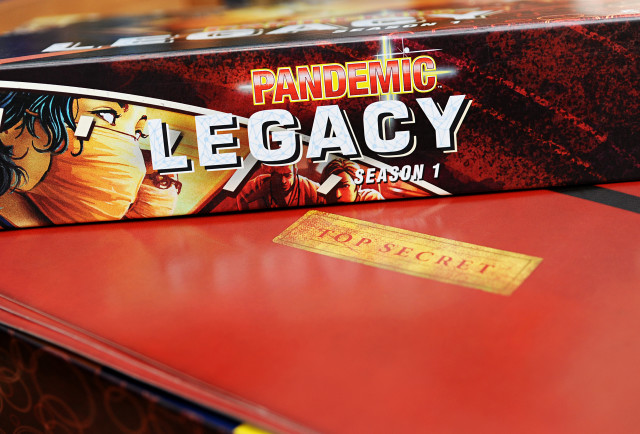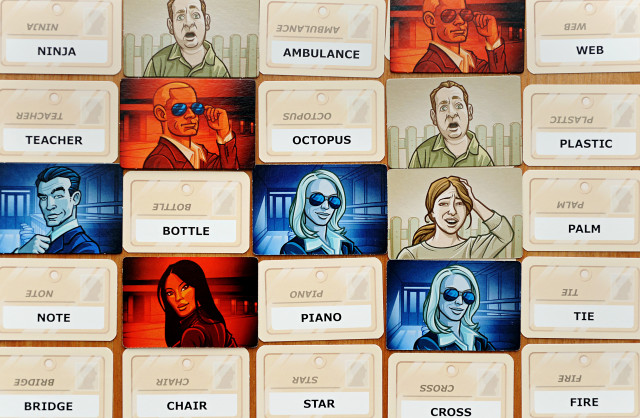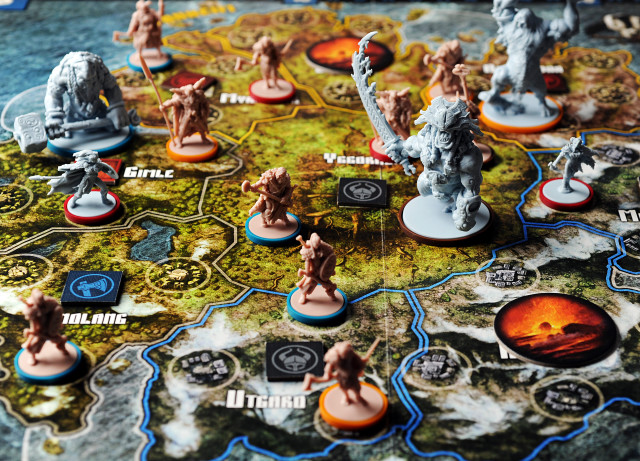This year, rather than listing 2015’s best games, or components, or themes, I decided to recount a more personal list of the highlights of my year in gaming. I do not offer this list as a rejection or repudiation of the more common practice. I look forward to these lists and will peruse this year’s crop of “best of” discussions with pleasure. But this year, I wanted to share the three lessons I learned from gaming in 2015.
While the lessons I have learned are personal, it is my hope and expectation that they are relatable. I imagine that many of you have drawn similar lessons from your gaming experiences.
So with this clumsy preface complete, let us commence.
Games are about what is around the table, not what is on it
A few months ago, I had the pleasure of playing my first legacy game. While I have played the occasional game of Risk: Legacy, it was not until I received and played Z-Man Games’ Pandemic: Legacy that I had experienced a legacy game from start to finish.
Notably, I was able to play this game with three of my dearest friends. We started the game together and over the span of more than a month, we gathered at least once a week to take on the ever growing challenge of defeating a plague that threatened to wipe out humanity, in the worst way imaginable.
 During these game plays, we swore and laughed and marveled at our worsening fortune. We opened boxes with a mix of glee and anxiety. As characters changed and their backstories evolved, we started to play out developing relationships, within the context of the game. One character became known for his philandering ways, another became a sycophantic yes man, and a third devolved into a whimpering puddle whenever circumstances became dire. In other words, every game quickly became a hot mess of chaos and laughter.
During these game plays, we swore and laughed and marveled at our worsening fortune. We opened boxes with a mix of glee and anxiety. As characters changed and their backstories evolved, we started to play out developing relationships, within the context of the game. One character became known for his philandering ways, another became a sycophantic yes man, and a third devolved into a whimpering puddle whenever circumstances became dire. In other words, every game quickly became a hot mess of chaos and laughter.
While the game facilitated this experience, it hardly compelled it. However, the trust, confidence, and genuine affection that the players felt for one another made our digressions a joy. While we played the game with a sincere desire to win, we framed each experience within the world building that we had all tacitly agreed to embrace.
I doubt I will ever play another game like this again. There are certain details of our plays that propriety prohibits me from recounting, but rest assured they will not soon be forgotten.
However, I am confident that whether I am playing another legacy game, setting out on a day trip, bowling on a Sunday afternoon, or singing songs at a cheap karaoke bar; if I am in the company of these three people, the experience is likely to be memorable.
All in all, the experience of playing Pandemic: Legacy reminded me, when you surrounded yourself with people you trust and whose company you sincerely enjoy, every experience has the opportunity to be remarkable.
You can’t love the game you don’t play
As a board game reviewer, playing new games can occasionally become a bit of a chore. I confess this fully aware of how it whiney it may sound. But I doubt any reviewer who has done this for an appreciable amount of time would contradict me.
While we all love board games, we do not love all board games. Moreover, as the point of the proverbial spear, reviewers often select and play games without the benefit of community consensus. Therefore, we tend to play more bad games than we otherwise might. And sadly, time spent playing a game we do not like, is time we cannot spend playing one we do.
As a result, when it comes to selecting games, I sometimes give my initial gut response undue influence. If the look or description of a game does not appeal to me, I hesitate to give it much of my time or attention. While I try to be open minded; I often fail.
 At GenCon 2015, I got a chance to play a game which, at first, held no appeal for me. It had a few things going against it. It was a party game; a style of game I typically do not enjoy. It involved people trying to guess a word using limited clues; a mechanic that I find to be tired and predictable. It was a small box game that consisted of little more than unadorned white cards with words written on them. Even its name, Codenames, fell flat for me. However, it was designed by Vlaada Chvátil, published by Czech Games Edition, and recommend by friends whose taste I trust.
At GenCon 2015, I got a chance to play a game which, at first, held no appeal for me. It had a few things going against it. It was a party game; a style of game I typically do not enjoy. It involved people trying to guess a word using limited clues; a mechanic that I find to be tired and predictable. It was a small box game that consisted of little more than unadorned white cards with words written on them. Even its name, Codenames, fell flat for me. However, it was designed by Vlaada Chvátil, published by Czech Games Edition, and recommend by friends whose taste I trust.
In the end, the points in the game’s favor overcame my misgivings. I picked up a copy on the first day of GenCon and proceeded to play it every night thereafter.
Put simply, this game is a joy. It is smart, engaging, elegantly crafted, and accessible. From short games with my children over breakfast to an epic late night session with 20 frazzled coders, I have yet to encounter a play of Codenames that I did not enjoy.
Had I not pushed past my resistance and played this game with an open mind I would have missed out on many great game sessions. Likewise, every time I say “no” to an opportunity or experience based solely upon instinct or pre-judgment, I deny myself the chance to discover something wonderful. So, whether it is a game that doesn’t “jump off the shelf at me” or a chance to volunteer at my local soup kitchen, Codenames taught me to take more chances by saying “yes”.
Sometimes, starting over makes sense
It was our first game of Blood Rage and things were not going well. First, we discovered that we had interpreted one of the Monster Upgrades wrong. We then realized that we were resolving some Clan Upgrades in the wrong order. Finally, we discovered that we had messed up the pillaging rule. In other words, the game was a mess.
As a group, we were frustrated with ourselves and the game. We had spent more than 40 minutes plodding through, encountering one problem after another. In retrospect, we all acknowledged we should have taken more time reading the rules; but here we were, much of our night seemingly wasted. Should we muscle through, start over, or scrap the game entirely and move onto something else? While our game play experience was not pleasurable, all of us believed that there was good game in there, we just had to find it. In the end, we decided that we would put the game aside for a while so that I and another one of the players could review the rules more carefully in anticipation of a later play.
 A few nights later; after the two of us had re-read the rules, talked through some ambiguities, and perused a few on-line resources, we got the gang back together and gave Blood Rage another try. The game play was initially a little tense. We were all mindful of the mistakes we had made and approached the game more deliberately than me otherwise might. All of us were attuned to our prior errors and predisposed to question ourselves. More than once, a player asked to look at the rulebook in spite of assurances that we were playing the game correctly.
A few nights later; after the two of us had re-read the rules, talked through some ambiguities, and perused a few on-line resources, we got the gang back together and gave Blood Rage another try. The game play was initially a little tense. We were all mindful of the mistakes we had made and approached the game more deliberately than me otherwise might. All of us were attuned to our prior errors and predisposed to question ourselves. More than once, a player asked to look at the rulebook in spite of assurances that we were playing the game correctly.
However, everyone was patient and fairly understanding. After a while, we became confident that we had properly prepared for this second session. Rules that seemed confusing, started to make sense. We became familiar with the game’s quirks and started to appreciate how elements that initially seemed odd or unbalanced worked. By the beginning of the second era, the game flow had been established and everyone was beginning to appreciate the game’s tactical challenges.
That night ended after three plays and the next game night consisted of three more. Blood Rage was a hit. Players were refining preferred strategies, experimenting with new tactics, and testing the games limits.
We didn’t give up on the game. We dropped back, considered our failures, worked to correct them, and gave the game another try. While we were all frustrated and even a little angry after our first session, we went into the next session fresh. Though nothing was said, everyone agreed to approach the second game with care and attention. No one got blamed and everyone worked together to get it right. Informed by our prior errors, we took the time needed to find our stride and confidence. As a result, we were all given an opportunity to play a game that is currently a group favorite.
As some of you know, more than a year ago, my wife and I separated. The year was hard, the experience was trying. As one might expect, both of us were frustrated and angry.
However, after some time, some space, and some reflection; we both realized that starting over may make sense. We both realized there was something good in there, we just had to find it.
So that is just what we did; or rather, that is just what we are doing. As we “give this game another try,” I hope to draw a few lesson from that those two nights of Blood Rage (the irony and absurdity of that sentence is not lost on me).
Whether you are starting over a botched game or moving forward from a personal failure, the basic steps for success are the same. Consider your failures, correct them, move forward with care and without blame, work with others so that you can get it right, and be open to eventually finding your stride.
So those are some of the lessons I learned from playing games in 2015. I imagine next years I will have new mistakes to make, new experiences to recount, and new lessons to learn. Thankfully, there are tons of great games out there, and no doubt I have many lessons yet to learn.
Loved this. Games are about so much more than the pieces on the table. We need more writing like this in our space!
Absolutely agree Dwight. Patrick has a way of talking about what games are really about; the people and relationships that surround them.